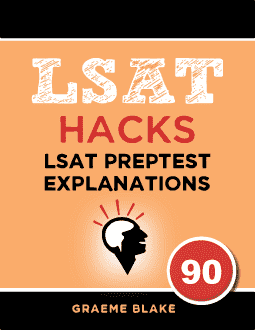QUESTION TEXT: Official: Six months ago, the fines for parking violations…
QUESTION TYPE: Flaw
CONCLUSION: We should raise fines again to reduce violations.
REASONING: Six months ago we raised fines to help fund a new garage. Parking violations dropped by half.
ANALYSIS: This is mistaking correlation with causation. Just because the fines were raised prior to the dip in violations doesn’t mean that raising the fines caused the drop in violations. The official is disregarding alternative explanations. The most obvious one being the new parking garage. Why do people break parking laws? Because they haven’t space to park. If there are more spaces to park then it is much easier to park while obeying the law.
___________
- The stimulus doesn’t mention what the effects of the parking violation reductions are. Eliminate.
Example of flaw: There was a reduction in parking violations. An effect of this reduction is pedestrians feel safe. So pedestrians’ feelings of safety may have caused the decline in parking violations. - “At least as much” is problematic. It doesn’t need to be by at least as much, the conclusion only claimed there would be a reduction. This isn’t a flaw here.
- Does it matter that the argument doesn’t take into account the financial benefits? No! The argument is talking about a hypothetical situation, saying what would happen if we wanted to reduce violations further. This isn’t a flaw.
- We don’t know anything about people’s preferences. But in any case, the author doesn’t have to believe that people prefer to park legally, in their heart of hearts. Rather, the argument only has to assume that people prefer not to get fined. Which is a reasonable assumption. Other things equal people prefer not to lose money. Many people would prefer to break the law but don’t, because of the risk.
- CORRECT. This matches our prephrase and introduces an alternative reason why there was a decrease in parking violations.
Recap: The question begins with “Official: Six months ago, the fines for parking violations”. It is a Flawed Reasoning question. Learn how to master LSAT Flaw questions on the LSAT Logical Reasoning question types page.


Leave a Reply